Reflective Essay: Moral Norms, Values, and Ethical Relativism
VerifiedAdded on 2021/04/17
|10
|2942
|38
Essay
AI Summary
This reflective essay delves into the critical importance of moral norms, values, and ethical frameworks in both personal and professional contexts. The essay begins by defining morality and ethical values, emphasizing their relevance in decision-making and societal conduct, and highlighting the impact of individual ethics on personal and organizational success. The discussion explores personal ethical frameworks, drawing on deontological ethics and the principles of honesty, integrity, fairness, and social responsibility. The essay then analyzes ethical relativism, contrasting universal moral principles with the concept that values are relative to culture. It critiques ethical relativism, arguing for the universality of fundamental values like honesty and fairness, and discusses the implications of relativism on issues such as human rights and business ethics. The essay concludes by reinforcing the need for ethical principles in guiding personal actions and organizational decisions, advocating for organizational justice and social responsibility, and emphasizing the ongoing need for spiritual, emotional, and cognitive investment in ethical development.
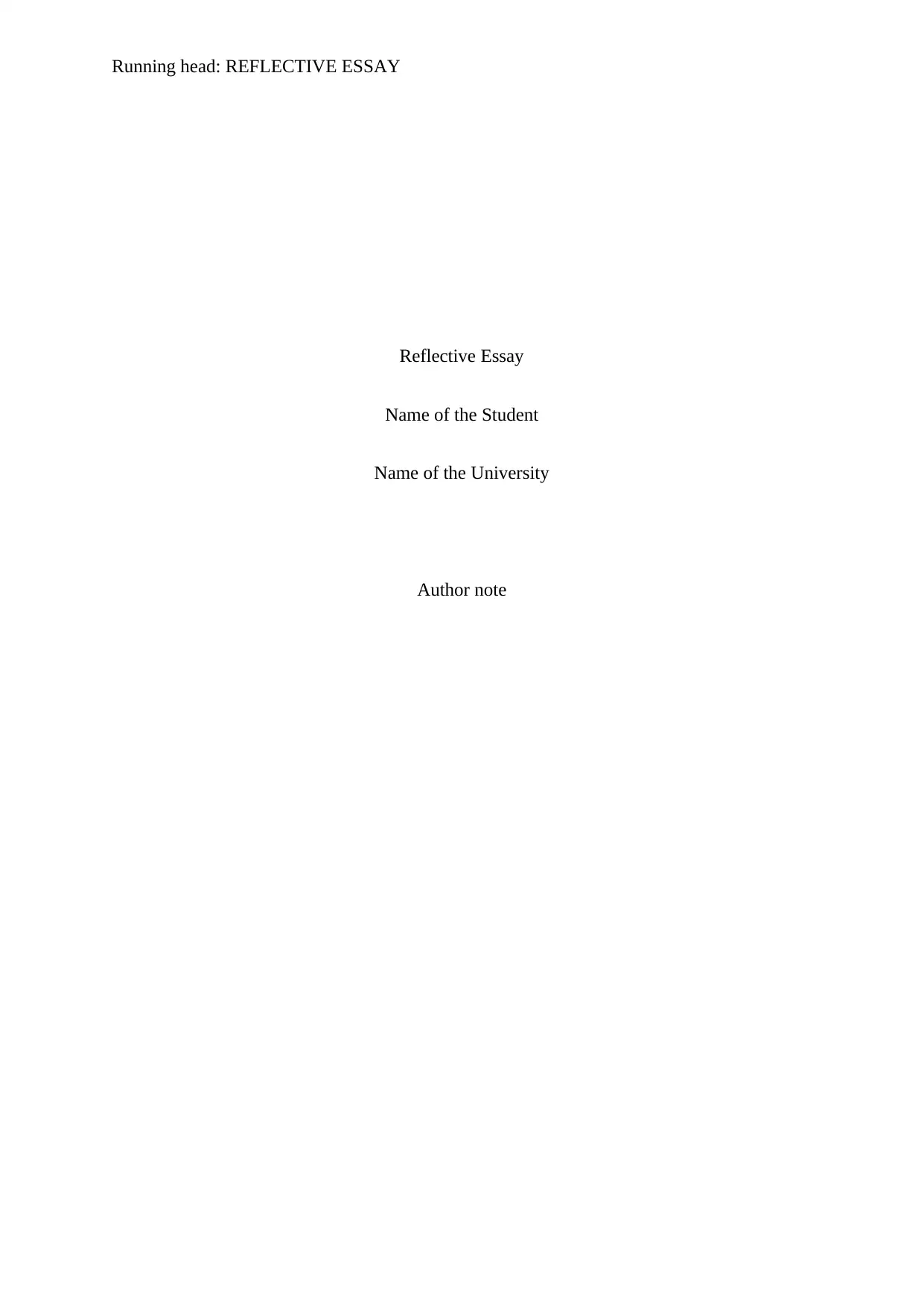
Running head: REFLECTIVE ESSAY
Reflective Essay
Name of the Student
Name of the University
Author note
Reflective Essay
Name of the Student
Name of the University
Author note
Paraphrase This Document
Need a fresh take? Get an instant paraphrase of this document with our AI Paraphraser
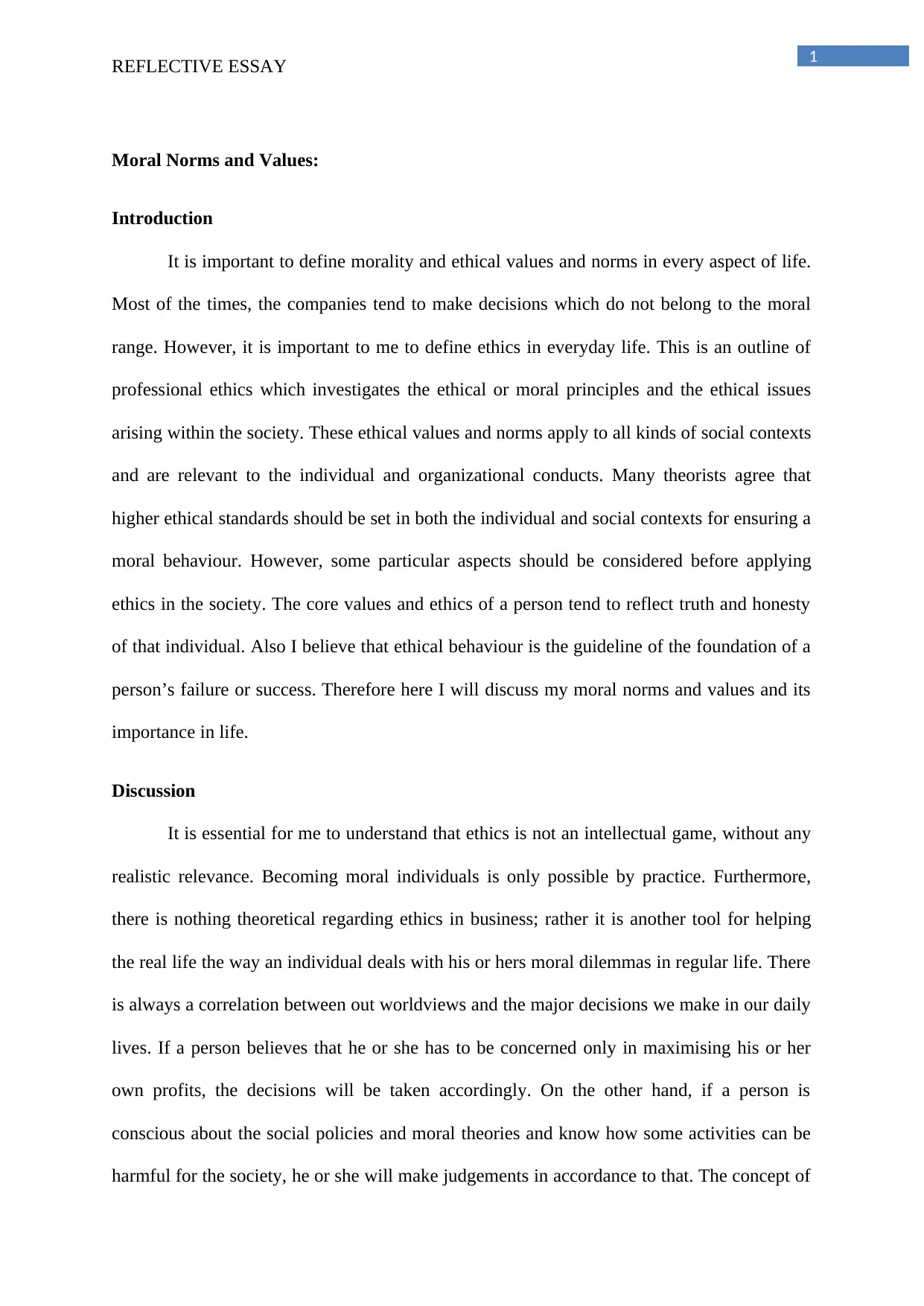
1
REFLECTIVE ESSAY
Moral Norms and Values:
Introduction
It is important to define morality and ethical values and norms in every aspect of life.
Most of the times, the companies tend to make decisions which do not belong to the moral
range. However, it is important to me to define ethics in everyday life. This is an outline of
professional ethics which investigates the ethical or moral principles and the ethical issues
arising within the society. These ethical values and norms apply to all kinds of social contexts
and are relevant to the individual and organizational conducts. Many theorists agree that
higher ethical standards should be set in both the individual and social contexts for ensuring a
moral behaviour. However, some particular aspects should be considered before applying
ethics in the society. The core values and ethics of a person tend to reflect truth and honesty
of that individual. Also I believe that ethical behaviour is the guideline of the foundation of a
person’s failure or success. Therefore here I will discuss my moral norms and values and its
importance in life.
Discussion
It is essential for me to understand that ethics is not an intellectual game, without any
realistic relevance. Becoming moral individuals is only possible by practice. Furthermore,
there is nothing theoretical regarding ethics in business; rather it is another tool for helping
the real life the way an individual deals with his or hers moral dilemmas in regular life. There
is always a correlation between out worldviews and the major decisions we make in our daily
lives. If a person believes that he or she has to be concerned only in maximising his or her
own profits, the decisions will be taken accordingly. On the other hand, if a person is
conscious about the social policies and moral theories and know how some activities can be
harmful for the society, he or she will make judgements in accordance to that. The concept of
REFLECTIVE ESSAY
Moral Norms and Values:
Introduction
It is important to define morality and ethical values and norms in every aspect of life.
Most of the times, the companies tend to make decisions which do not belong to the moral
range. However, it is important to me to define ethics in everyday life. This is an outline of
professional ethics which investigates the ethical or moral principles and the ethical issues
arising within the society. These ethical values and norms apply to all kinds of social contexts
and are relevant to the individual and organizational conducts. Many theorists agree that
higher ethical standards should be set in both the individual and social contexts for ensuring a
moral behaviour. However, some particular aspects should be considered before applying
ethics in the society. The core values and ethics of a person tend to reflect truth and honesty
of that individual. Also I believe that ethical behaviour is the guideline of the foundation of a
person’s failure or success. Therefore here I will discuss my moral norms and values and its
importance in life.
Discussion
It is essential for me to understand that ethics is not an intellectual game, without any
realistic relevance. Becoming moral individuals is only possible by practice. Furthermore,
there is nothing theoretical regarding ethics in business; rather it is another tool for helping
the real life the way an individual deals with his or hers moral dilemmas in regular life. There
is always a correlation between out worldviews and the major decisions we make in our daily
lives. If a person believes that he or she has to be concerned only in maximising his or her
own profits, the decisions will be taken accordingly. On the other hand, if a person is
conscious about the social policies and moral theories and know how some activities can be
harmful for the society, he or she will make judgements in accordance to that. The concept of
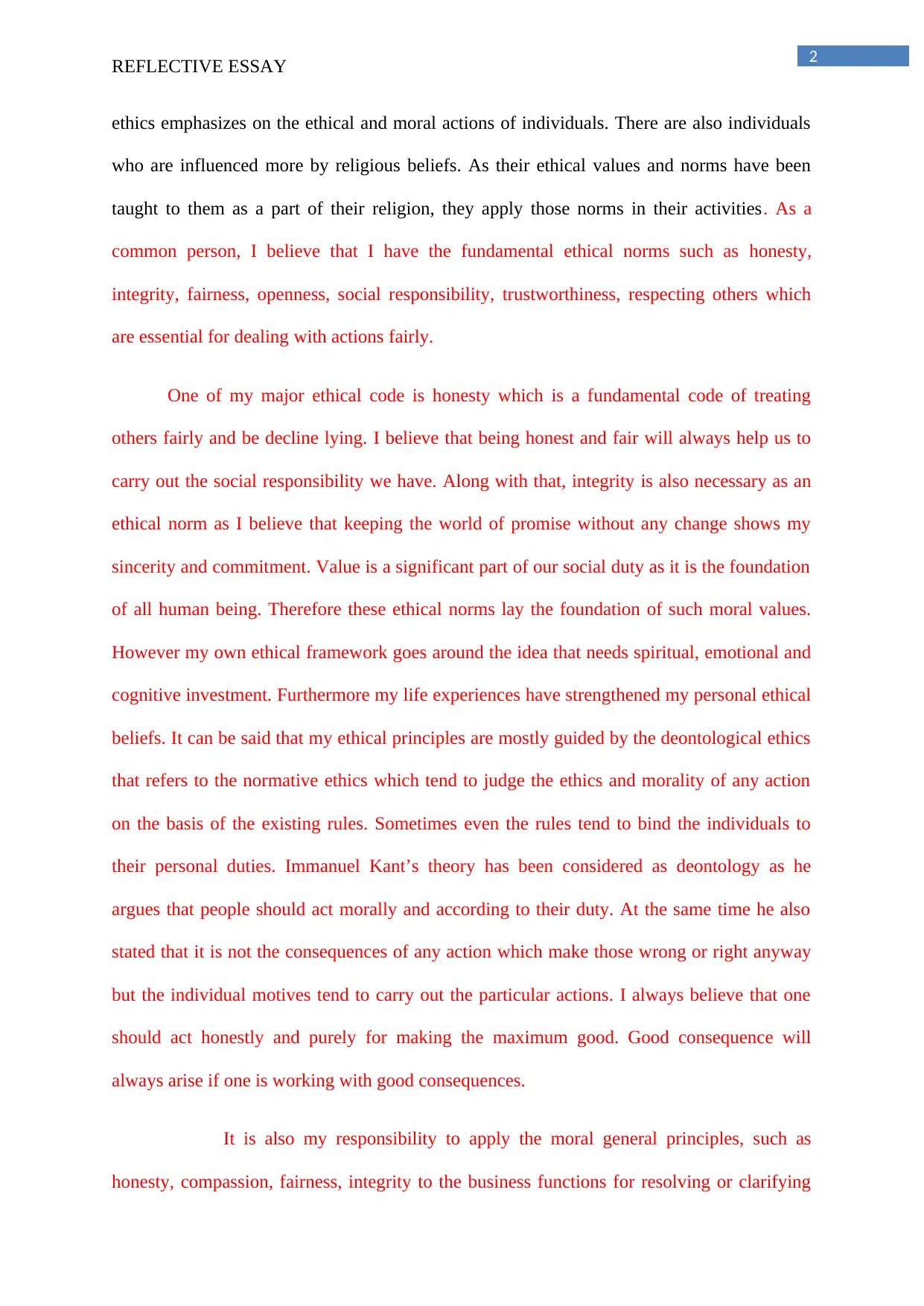
2
REFLECTIVE ESSAY
ethics emphasizes on the ethical and moral actions of individuals. There are also individuals
who are influenced more by religious beliefs. As their ethical values and norms have been
taught to them as a part of their religion, they apply those norms in their activities. As a
common person, I believe that I have the fundamental ethical norms such as honesty,
integrity, fairness, openness, social responsibility, trustworthiness, respecting others which
are essential for dealing with actions fairly.
One of my major ethical code is honesty which is a fundamental code of treating
others fairly and be decline lying. I believe that being honest and fair will always help us to
carry out the social responsibility we have. Along with that, integrity is also necessary as an
ethical norm as I believe that keeping the world of promise without any change shows my
sincerity and commitment. Value is a significant part of our social duty as it is the foundation
of all human being. Therefore these ethical norms lay the foundation of such moral values.
However my own ethical framework goes around the idea that needs spiritual, emotional and
cognitive investment. Furthermore my life experiences have strengthened my personal ethical
beliefs. It can be said that my ethical principles are mostly guided by the deontological ethics
that refers to the normative ethics which tend to judge the ethics and morality of any action
on the basis of the existing rules. Sometimes even the rules tend to bind the individuals to
their personal duties. Immanuel Kant’s theory has been considered as deontology as he
argues that people should act morally and according to their duty. At the same time he also
stated that it is not the consequences of any action which make those wrong or right anyway
but the individual motives tend to carry out the particular actions. I always believe that one
should act honestly and purely for making the maximum good. Good consequence will
always arise if one is working with good consequences.
It is also my responsibility to apply the moral general principles, such as
honesty, compassion, fairness, integrity to the business functions for resolving or clarifying
REFLECTIVE ESSAY
ethics emphasizes on the ethical and moral actions of individuals. There are also individuals
who are influenced more by religious beliefs. As their ethical values and norms have been
taught to them as a part of their religion, they apply those norms in their activities. As a
common person, I believe that I have the fundamental ethical norms such as honesty,
integrity, fairness, openness, social responsibility, trustworthiness, respecting others which
are essential for dealing with actions fairly.
One of my major ethical code is honesty which is a fundamental code of treating
others fairly and be decline lying. I believe that being honest and fair will always help us to
carry out the social responsibility we have. Along with that, integrity is also necessary as an
ethical norm as I believe that keeping the world of promise without any change shows my
sincerity and commitment. Value is a significant part of our social duty as it is the foundation
of all human being. Therefore these ethical norms lay the foundation of such moral values.
However my own ethical framework goes around the idea that needs spiritual, emotional and
cognitive investment. Furthermore my life experiences have strengthened my personal ethical
beliefs. It can be said that my ethical principles are mostly guided by the deontological ethics
that refers to the normative ethics which tend to judge the ethics and morality of any action
on the basis of the existing rules. Sometimes even the rules tend to bind the individuals to
their personal duties. Immanuel Kant’s theory has been considered as deontology as he
argues that people should act morally and according to their duty. At the same time he also
stated that it is not the consequences of any action which make those wrong or right anyway
but the individual motives tend to carry out the particular actions. I always believe that one
should act honestly and purely for making the maximum good. Good consequence will
always arise if one is working with good consequences.
It is also my responsibility to apply the moral general principles, such as
honesty, compassion, fairness, integrity to the business functions for resolving or clarifying
⊘ This is a preview!⊘
Do you want full access?
Subscribe today to unlock all pages.

Trusted by 1+ million students worldwide
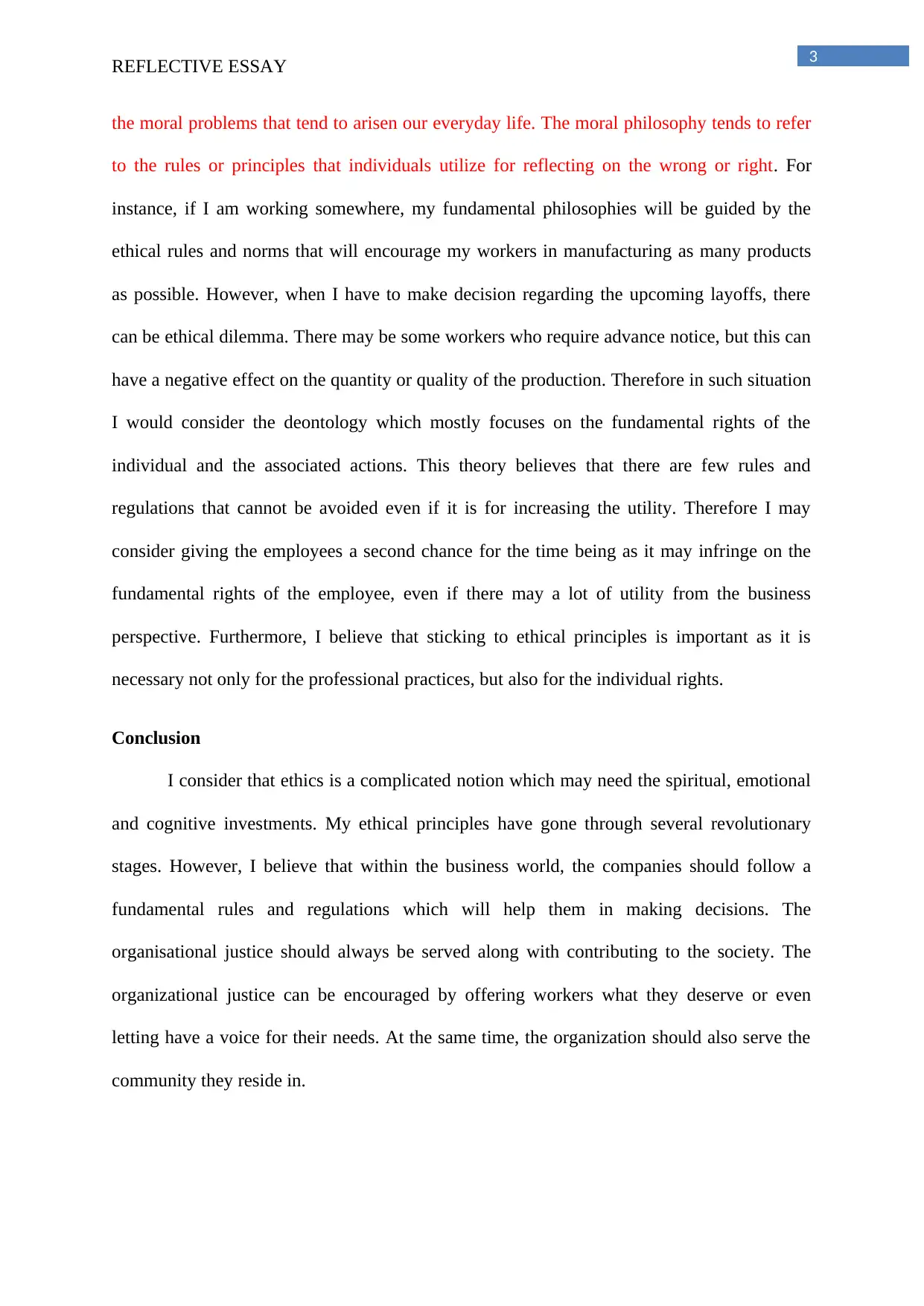
3
REFLECTIVE ESSAY
the moral problems that tend to arisen our everyday life. The moral philosophy tends to refer
to the rules or principles that individuals utilize for reflecting on the wrong or right. For
instance, if I am working somewhere, my fundamental philosophies will be guided by the
ethical rules and norms that will encourage my workers in manufacturing as many products
as possible. However, when I have to make decision regarding the upcoming layoffs, there
can be ethical dilemma. There may be some workers who require advance notice, but this can
have a negative effect on the quantity or quality of the production. Therefore in such situation
I would consider the deontology which mostly focuses on the fundamental rights of the
individual and the associated actions. This theory believes that there are few rules and
regulations that cannot be avoided even if it is for increasing the utility. Therefore I may
consider giving the employees a second chance for the time being as it may infringe on the
fundamental rights of the employee, even if there may a lot of utility from the business
perspective. Furthermore, I believe that sticking to ethical principles is important as it is
necessary not only for the professional practices, but also for the individual rights.
Conclusion
I consider that ethics is a complicated notion which may need the spiritual, emotional
and cognitive investments. My ethical principles have gone through several revolutionary
stages. However, I believe that within the business world, the companies should follow a
fundamental rules and regulations which will help them in making decisions. The
organisational justice should always be served along with contributing to the society. The
organizational justice can be encouraged by offering workers what they deserve or even
letting have a voice for their needs. At the same time, the organization should also serve the
community they reside in.
REFLECTIVE ESSAY
the moral problems that tend to arisen our everyday life. The moral philosophy tends to refer
to the rules or principles that individuals utilize for reflecting on the wrong or right. For
instance, if I am working somewhere, my fundamental philosophies will be guided by the
ethical rules and norms that will encourage my workers in manufacturing as many products
as possible. However, when I have to make decision regarding the upcoming layoffs, there
can be ethical dilemma. There may be some workers who require advance notice, but this can
have a negative effect on the quantity or quality of the production. Therefore in such situation
I would consider the deontology which mostly focuses on the fundamental rights of the
individual and the associated actions. This theory believes that there are few rules and
regulations that cannot be avoided even if it is for increasing the utility. Therefore I may
consider giving the employees a second chance for the time being as it may infringe on the
fundamental rights of the employee, even if there may a lot of utility from the business
perspective. Furthermore, I believe that sticking to ethical principles is important as it is
necessary not only for the professional practices, but also for the individual rights.
Conclusion
I consider that ethics is a complicated notion which may need the spiritual, emotional
and cognitive investments. My ethical principles have gone through several revolutionary
stages. However, I believe that within the business world, the companies should follow a
fundamental rules and regulations which will help them in making decisions. The
organisational justice should always be served along with contributing to the society. The
organizational justice can be encouraged by offering workers what they deserve or even
letting have a voice for their needs. At the same time, the organization should also serve the
community they reside in.
Paraphrase This Document
Need a fresh take? Get an instant paraphrase of this document with our AI Paraphraser
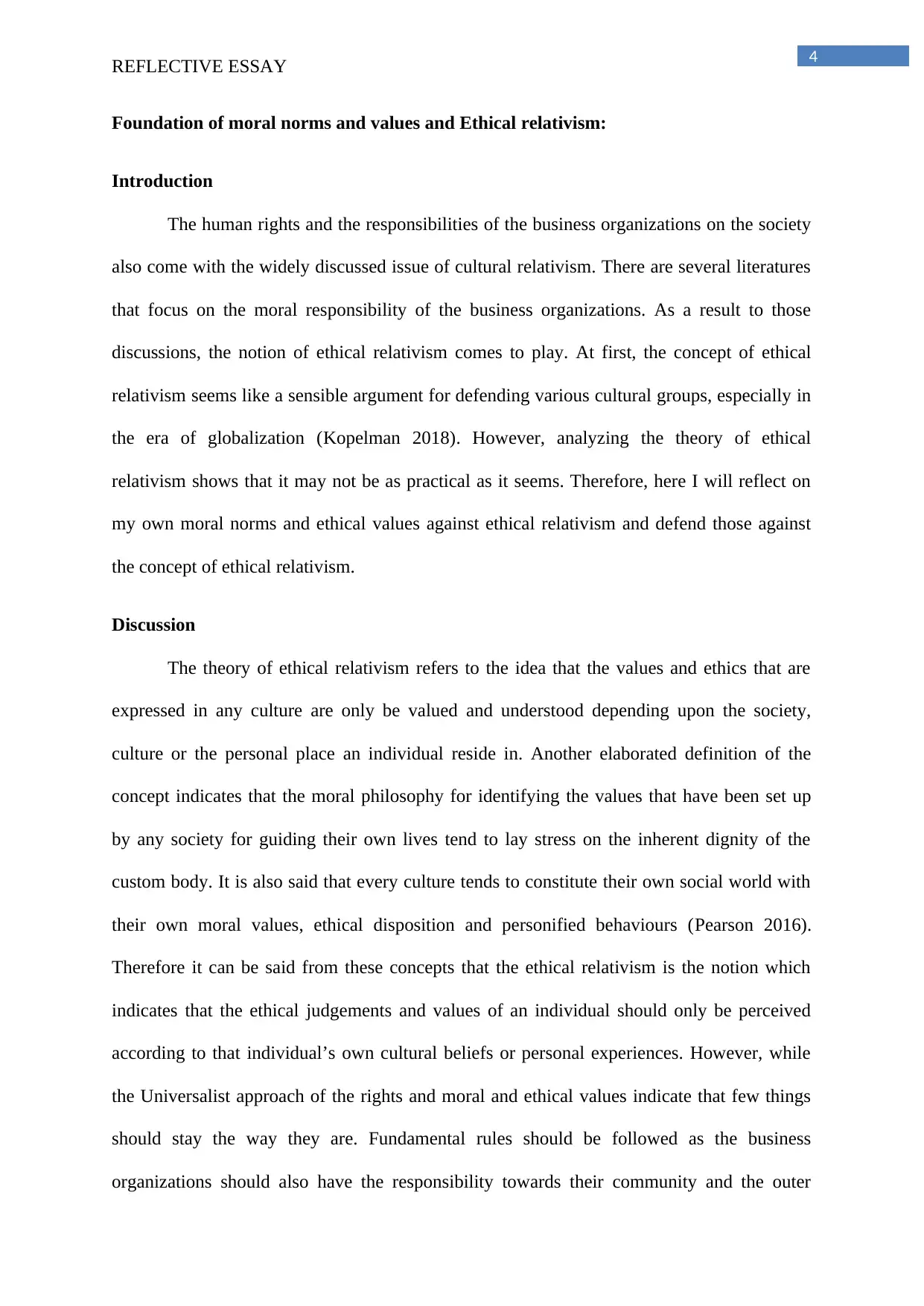
4
REFLECTIVE ESSAY
Foundation of moral norms and values and Ethical relativism:
Introduction
The human rights and the responsibilities of the business organizations on the society
also come with the widely discussed issue of cultural relativism. There are several literatures
that focus on the moral responsibility of the business organizations. As a result to those
discussions, the notion of ethical relativism comes to play. At first, the concept of ethical
relativism seems like a sensible argument for defending various cultural groups, especially in
the era of globalization (Kopelman 2018). However, analyzing the theory of ethical
relativism shows that it may not be as practical as it seems. Therefore, here I will reflect on
my own moral norms and ethical values against ethical relativism and defend those against
the concept of ethical relativism.
Discussion
The theory of ethical relativism refers to the idea that the values and ethics that are
expressed in any culture are only be valued and understood depending upon the society,
culture or the personal place an individual reside in. Another elaborated definition of the
concept indicates that the moral philosophy for identifying the values that have been set up
by any society for guiding their own lives tend to lay stress on the inherent dignity of the
custom body. It is also said that every culture tends to constitute their own social world with
their own moral values, ethical disposition and personified behaviours (Pearson 2016).
Therefore it can be said from these concepts that the ethical relativism is the notion which
indicates that the ethical judgements and values of an individual should only be perceived
according to that individual’s own cultural beliefs or personal experiences. However, while
the Universalist approach of the rights and moral and ethical values indicate that few things
should stay the way they are. Fundamental rules should be followed as the business
organizations should also have the responsibility towards their community and the outer
REFLECTIVE ESSAY
Foundation of moral norms and values and Ethical relativism:
Introduction
The human rights and the responsibilities of the business organizations on the society
also come with the widely discussed issue of cultural relativism. There are several literatures
that focus on the moral responsibility of the business organizations. As a result to those
discussions, the notion of ethical relativism comes to play. At first, the concept of ethical
relativism seems like a sensible argument for defending various cultural groups, especially in
the era of globalization (Kopelman 2018). However, analyzing the theory of ethical
relativism shows that it may not be as practical as it seems. Therefore, here I will reflect on
my own moral norms and ethical values against ethical relativism and defend those against
the concept of ethical relativism.
Discussion
The theory of ethical relativism refers to the idea that the values and ethics that are
expressed in any culture are only be valued and understood depending upon the society,
culture or the personal place an individual reside in. Another elaborated definition of the
concept indicates that the moral philosophy for identifying the values that have been set up
by any society for guiding their own lives tend to lay stress on the inherent dignity of the
custom body. It is also said that every culture tends to constitute their own social world with
their own moral values, ethical disposition and personified behaviours (Pearson 2016).
Therefore it can be said from these concepts that the ethical relativism is the notion which
indicates that the ethical judgements and values of an individual should only be perceived
according to that individual’s own cultural beliefs or personal experiences. However, while
the Universalist approach of the rights and moral and ethical values indicate that few things
should stay the way they are. Fundamental rules should be followed as the business
organizations should also have the responsibility towards their community and the outer
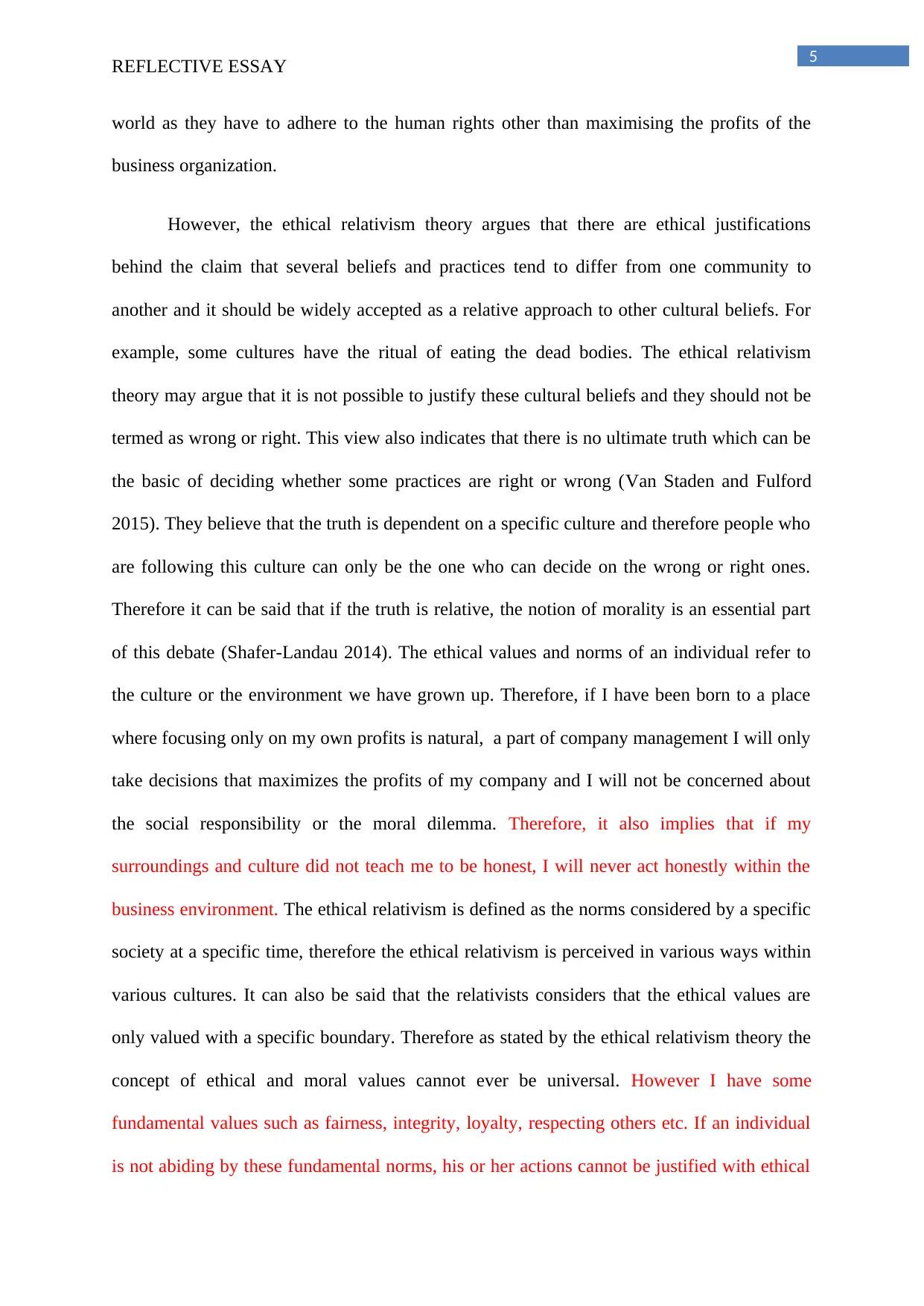
5
REFLECTIVE ESSAY
world as they have to adhere to the human rights other than maximising the profits of the
business organization.
However, the ethical relativism theory argues that there are ethical justifications
behind the claim that several beliefs and practices tend to differ from one community to
another and it should be widely accepted as a relative approach to other cultural beliefs. For
example, some cultures have the ritual of eating the dead bodies. The ethical relativism
theory may argue that it is not possible to justify these cultural beliefs and they should not be
termed as wrong or right. This view also indicates that there is no ultimate truth which can be
the basic of deciding whether some practices are right or wrong (Van Staden and Fulford
2015). They believe that the truth is dependent on a specific culture and therefore people who
are following this culture can only be the one who can decide on the wrong or right ones.
Therefore it can be said that if the truth is relative, the notion of morality is an essential part
of this debate (Shafer-Landau 2014). The ethical values and norms of an individual refer to
the culture or the environment we have grown up. Therefore, if I have been born to a place
where focusing only on my own profits is natural, a part of company management I will only
take decisions that maximizes the profits of my company and I will not be concerned about
the social responsibility or the moral dilemma. Therefore, it also implies that if my
surroundings and culture did not teach me to be honest, I will never act honestly within the
business environment. The ethical relativism is defined as the norms considered by a specific
society at a specific time, therefore the ethical relativism is perceived in various ways within
various cultures. It can also be said that the relativists considers that the ethical values are
only valued with a specific boundary. Therefore as stated by the ethical relativism theory the
concept of ethical and moral values cannot ever be universal. However I have some
fundamental values such as fairness, integrity, loyalty, respecting others etc. If an individual
is not abiding by these fundamental norms, his or her actions cannot be justified with ethical
REFLECTIVE ESSAY
world as they have to adhere to the human rights other than maximising the profits of the
business organization.
However, the ethical relativism theory argues that there are ethical justifications
behind the claim that several beliefs and practices tend to differ from one community to
another and it should be widely accepted as a relative approach to other cultural beliefs. For
example, some cultures have the ritual of eating the dead bodies. The ethical relativism
theory may argue that it is not possible to justify these cultural beliefs and they should not be
termed as wrong or right. This view also indicates that there is no ultimate truth which can be
the basic of deciding whether some practices are right or wrong (Van Staden and Fulford
2015). They believe that the truth is dependent on a specific culture and therefore people who
are following this culture can only be the one who can decide on the wrong or right ones.
Therefore it can be said that if the truth is relative, the notion of morality is an essential part
of this debate (Shafer-Landau 2014). The ethical values and norms of an individual refer to
the culture or the environment we have grown up. Therefore, if I have been born to a place
where focusing only on my own profits is natural, a part of company management I will only
take decisions that maximizes the profits of my company and I will not be concerned about
the social responsibility or the moral dilemma. Therefore, it also implies that if my
surroundings and culture did not teach me to be honest, I will never act honestly within the
business environment. The ethical relativism is defined as the norms considered by a specific
society at a specific time, therefore the ethical relativism is perceived in various ways within
various cultures. It can also be said that the relativists considers that the ethical values are
only valued with a specific boundary. Therefore as stated by the ethical relativism theory the
concept of ethical and moral values cannot ever be universal. However I have some
fundamental values such as fairness, integrity, loyalty, respecting others etc. If an individual
is not abiding by these fundamental norms, his or her actions cannot be justified with ethical
⊘ This is a preview!⊘
Do you want full access?
Subscribe today to unlock all pages.

Trusted by 1+ million students worldwide
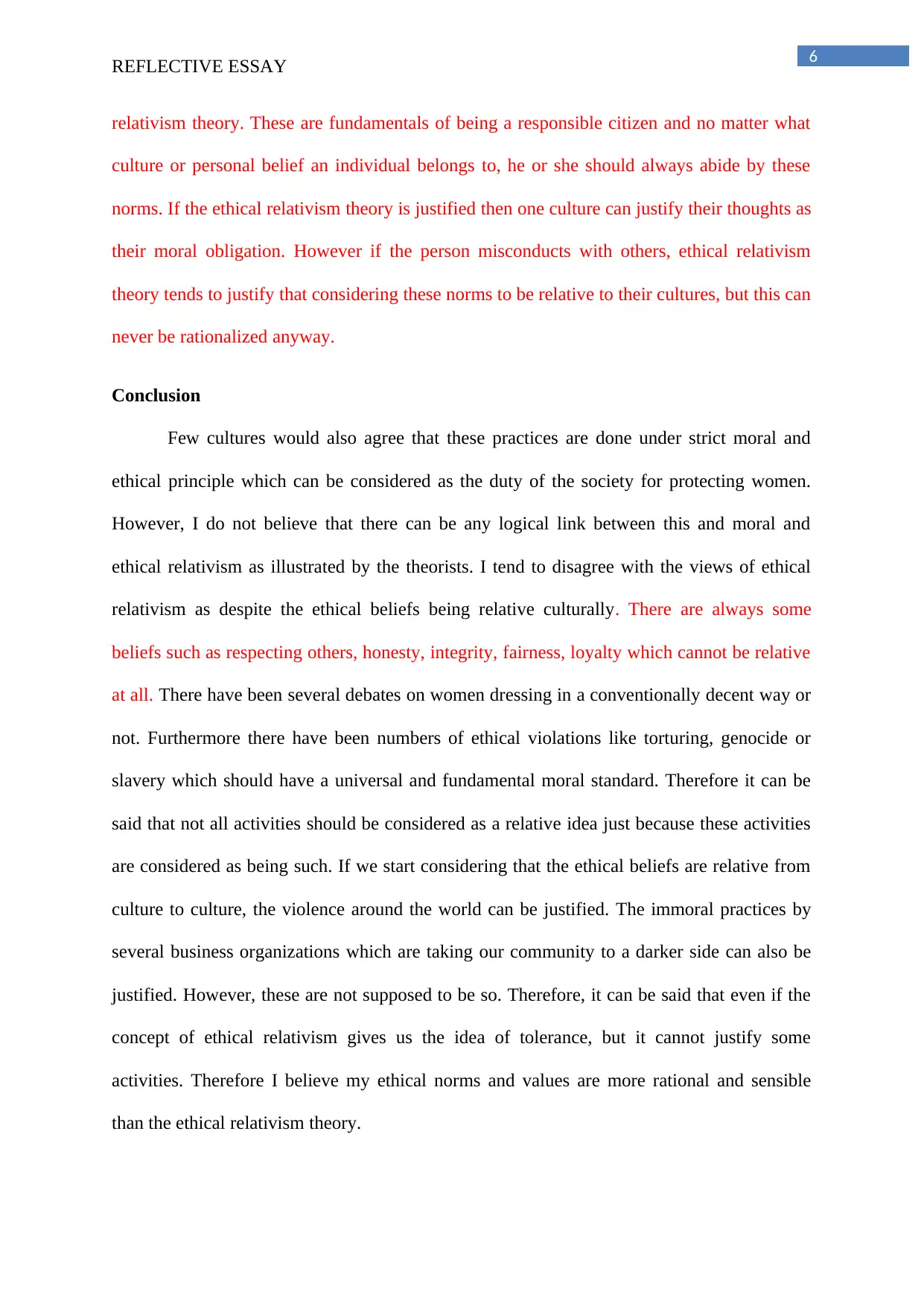
6
REFLECTIVE ESSAY
relativism theory. These are fundamentals of being a responsible citizen and no matter what
culture or personal belief an individual belongs to, he or she should always abide by these
norms. If the ethical relativism theory is justified then one culture can justify their thoughts as
their moral obligation. However if the person misconducts with others, ethical relativism
theory tends to justify that considering these norms to be relative to their cultures, but this can
never be rationalized anyway.
Conclusion
Few cultures would also agree that these practices are done under strict moral and
ethical principle which can be considered as the duty of the society for protecting women.
However, I do not believe that there can be any logical link between this and moral and
ethical relativism as illustrated by the theorists. I tend to disagree with the views of ethical
relativism as despite the ethical beliefs being relative culturally. There are always some
beliefs such as respecting others, honesty, integrity, fairness, loyalty which cannot be relative
at all. There have been several debates on women dressing in a conventionally decent way or
not. Furthermore there have been numbers of ethical violations like torturing, genocide or
slavery which should have a universal and fundamental moral standard. Therefore it can be
said that not all activities should be considered as a relative idea just because these activities
are considered as being such. If we start considering that the ethical beliefs are relative from
culture to culture, the violence around the world can be justified. The immoral practices by
several business organizations which are taking our community to a darker side can also be
justified. However, these are not supposed to be so. Therefore, it can be said that even if the
concept of ethical relativism gives us the idea of tolerance, but it cannot justify some
activities. Therefore I believe my ethical norms and values are more rational and sensible
than the ethical relativism theory.
REFLECTIVE ESSAY
relativism theory. These are fundamentals of being a responsible citizen and no matter what
culture or personal belief an individual belongs to, he or she should always abide by these
norms. If the ethical relativism theory is justified then one culture can justify their thoughts as
their moral obligation. However if the person misconducts with others, ethical relativism
theory tends to justify that considering these norms to be relative to their cultures, but this can
never be rationalized anyway.
Conclusion
Few cultures would also agree that these practices are done under strict moral and
ethical principle which can be considered as the duty of the society for protecting women.
However, I do not believe that there can be any logical link between this and moral and
ethical relativism as illustrated by the theorists. I tend to disagree with the views of ethical
relativism as despite the ethical beliefs being relative culturally. There are always some
beliefs such as respecting others, honesty, integrity, fairness, loyalty which cannot be relative
at all. There have been several debates on women dressing in a conventionally decent way or
not. Furthermore there have been numbers of ethical violations like torturing, genocide or
slavery which should have a universal and fundamental moral standard. Therefore it can be
said that not all activities should be considered as a relative idea just because these activities
are considered as being such. If we start considering that the ethical beliefs are relative from
culture to culture, the violence around the world can be justified. The immoral practices by
several business organizations which are taking our community to a darker side can also be
justified. However, these are not supposed to be so. Therefore, it can be said that even if the
concept of ethical relativism gives us the idea of tolerance, but it cannot justify some
activities. Therefore I believe my ethical norms and values are more rational and sensible
than the ethical relativism theory.
Paraphrase This Document
Need a fresh take? Get an instant paraphrase of this document with our AI Paraphraser
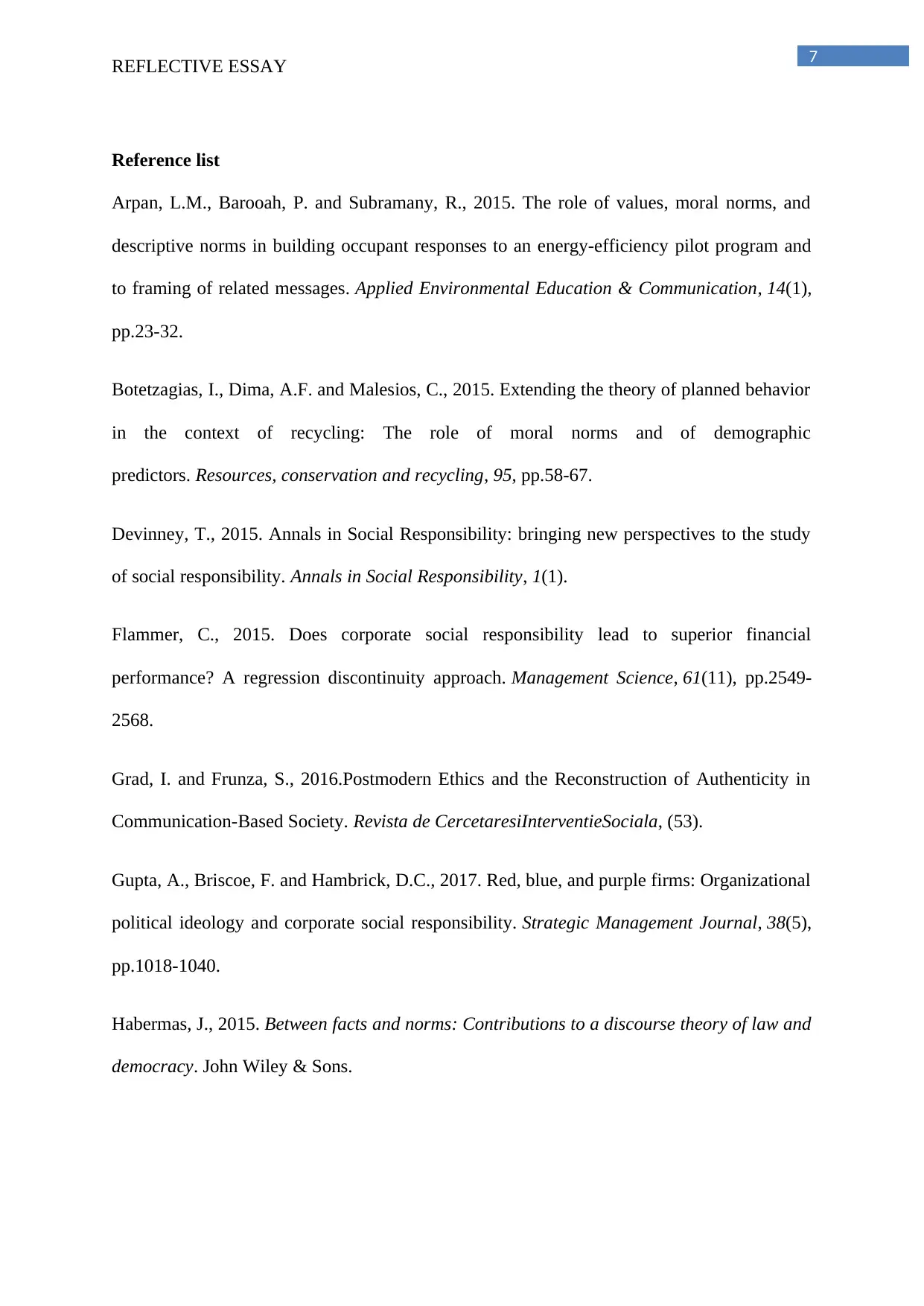
7
REFLECTIVE ESSAY
Reference list
Arpan, L.M., Barooah, P. and Subramany, R., 2015. The role of values, moral norms, and
descriptive norms in building occupant responses to an energy-efficiency pilot program and
to framing of related messages. Applied Environmental Education & Communication, 14(1),
pp.23-32.
Botetzagias, I., Dima, A.F. and Malesios, C., 2015. Extending the theory of planned behavior
in the context of recycling: The role of moral norms and of demographic
predictors. Resources, conservation and recycling, 95, pp.58-67.
Devinney, T., 2015. Annals in Social Responsibility: bringing new perspectives to the study
of social responsibility. Annals in Social Responsibility, 1(1).
Flammer, C., 2015. Does corporate social responsibility lead to superior financial
performance? A regression discontinuity approach. Management Science, 61(11), pp.2549-
2568.
Grad, I. and Frunza, S., 2016.Postmodern Ethics and the Reconstruction of Authenticity in
Communication-Based Society. Revista de CercetaresiInterventieSociala, (53).
Gupta, A., Briscoe, F. and Hambrick, D.C., 2017. Red, blue, and purple firms: Organizational
political ideology and corporate social responsibility. Strategic Management Journal, 38(5),
pp.1018-1040.
Habermas, J., 2015. Between facts and norms: Contributions to a discourse theory of law and
democracy. John Wiley & Sons.
REFLECTIVE ESSAY
Reference list
Arpan, L.M., Barooah, P. and Subramany, R., 2015. The role of values, moral norms, and
descriptive norms in building occupant responses to an energy-efficiency pilot program and
to framing of related messages. Applied Environmental Education & Communication, 14(1),
pp.23-32.
Botetzagias, I., Dima, A.F. and Malesios, C., 2015. Extending the theory of planned behavior
in the context of recycling: The role of moral norms and of demographic
predictors. Resources, conservation and recycling, 95, pp.58-67.
Devinney, T., 2015. Annals in Social Responsibility: bringing new perspectives to the study
of social responsibility. Annals in Social Responsibility, 1(1).
Flammer, C., 2015. Does corporate social responsibility lead to superior financial
performance? A regression discontinuity approach. Management Science, 61(11), pp.2549-
2568.
Grad, I. and Frunza, S., 2016.Postmodern Ethics and the Reconstruction of Authenticity in
Communication-Based Society. Revista de CercetaresiInterventieSociala, (53).
Gupta, A., Briscoe, F. and Hambrick, D.C., 2017. Red, blue, and purple firms: Organizational
political ideology and corporate social responsibility. Strategic Management Journal, 38(5),
pp.1018-1040.
Habermas, J., 2015. Between facts and norms: Contributions to a discourse theory of law and
democracy. John Wiley & Sons.
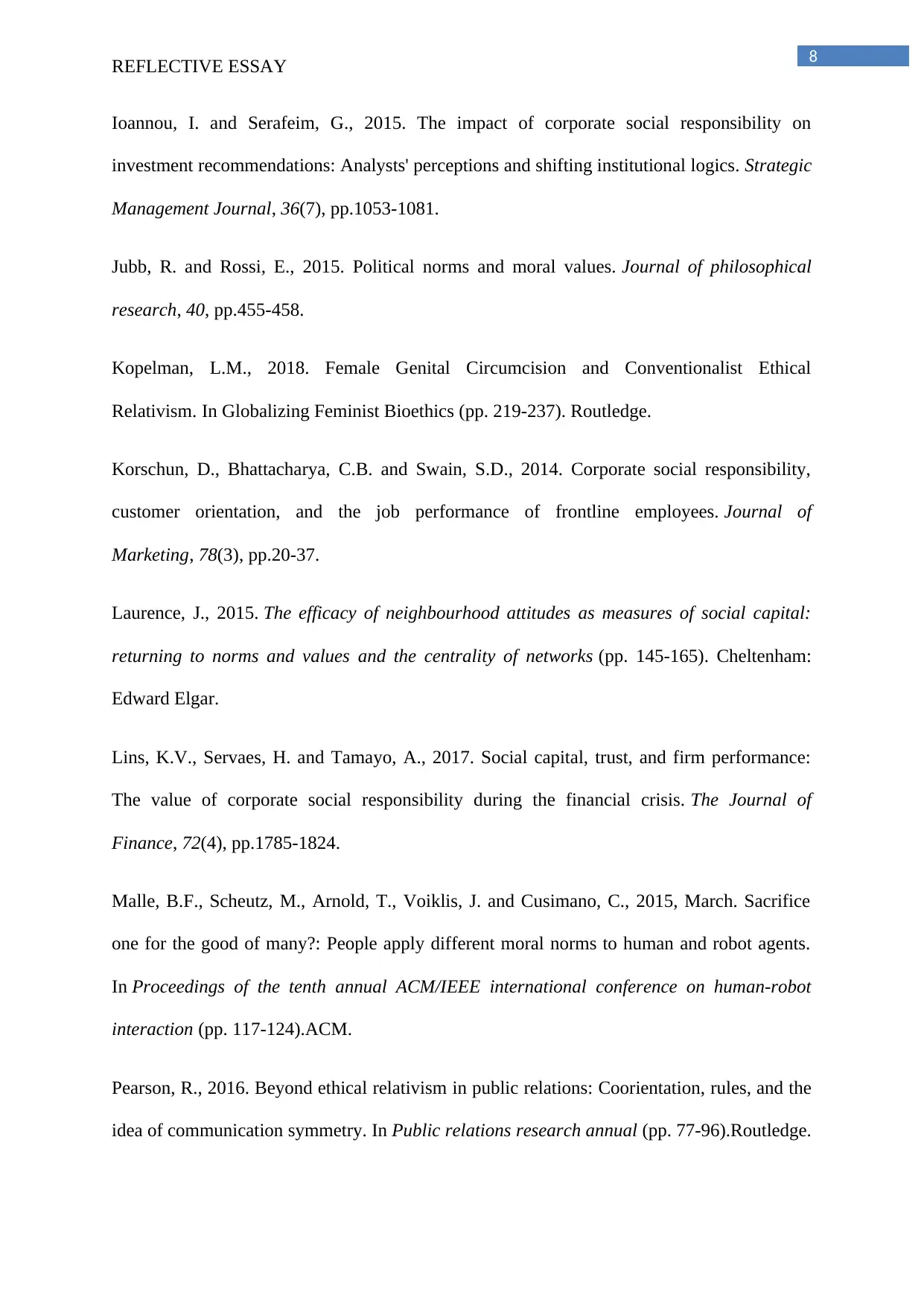
8
REFLECTIVE ESSAY
Ioannou, I. and Serafeim, G., 2015. The impact of corporate social responsibility on
investment recommendations: Analysts' perceptions and shifting institutional logics. Strategic
Management Journal, 36(7), pp.1053-1081.
Jubb, R. and Rossi, E., 2015. Political norms and moral values. Journal of philosophical
research, 40, pp.455-458.
Kopelman, L.M., 2018. Female Genital Circumcision and Conventionalist Ethical
Relativism. In Globalizing Feminist Bioethics (pp. 219-237). Routledge.
Korschun, D., Bhattacharya, C.B. and Swain, S.D., 2014. Corporate social responsibility,
customer orientation, and the job performance of frontline employees. Journal of
Marketing, 78(3), pp.20-37.
Laurence, J., 2015. The efficacy of neighbourhood attitudes as measures of social capital:
returning to norms and values and the centrality of networks (pp. 145-165). Cheltenham:
Edward Elgar.
Lins, K.V., Servaes, H. and Tamayo, A., 2017. Social capital, trust, and firm performance:
The value of corporate social responsibility during the financial crisis. The Journal of
Finance, 72(4), pp.1785-1824.
Malle, B.F., Scheutz, M., Arnold, T., Voiklis, J. and Cusimano, C., 2015, March. Sacrifice
one for the good of many?: People apply different moral norms to human and robot agents.
In Proceedings of the tenth annual ACM/IEEE international conference on human-robot
interaction (pp. 117-124).ACM.
Pearson, R., 2016. Beyond ethical relativism in public relations: Coorientation, rules, and the
idea of communication symmetry. In Public relations research annual (pp. 77-96).Routledge.
REFLECTIVE ESSAY
Ioannou, I. and Serafeim, G., 2015. The impact of corporate social responsibility on
investment recommendations: Analysts' perceptions and shifting institutional logics. Strategic
Management Journal, 36(7), pp.1053-1081.
Jubb, R. and Rossi, E., 2015. Political norms and moral values. Journal of philosophical
research, 40, pp.455-458.
Kopelman, L.M., 2018. Female Genital Circumcision and Conventionalist Ethical
Relativism. In Globalizing Feminist Bioethics (pp. 219-237). Routledge.
Korschun, D., Bhattacharya, C.B. and Swain, S.D., 2014. Corporate social responsibility,
customer orientation, and the job performance of frontline employees. Journal of
Marketing, 78(3), pp.20-37.
Laurence, J., 2015. The efficacy of neighbourhood attitudes as measures of social capital:
returning to norms and values and the centrality of networks (pp. 145-165). Cheltenham:
Edward Elgar.
Lins, K.V., Servaes, H. and Tamayo, A., 2017. Social capital, trust, and firm performance:
The value of corporate social responsibility during the financial crisis. The Journal of
Finance, 72(4), pp.1785-1824.
Malle, B.F., Scheutz, M., Arnold, T., Voiklis, J. and Cusimano, C., 2015, March. Sacrifice
one for the good of many?: People apply different moral norms to human and robot agents.
In Proceedings of the tenth annual ACM/IEEE international conference on human-robot
interaction (pp. 117-124).ACM.
Pearson, R., 2016. Beyond ethical relativism in public relations: Coorientation, rules, and the
idea of communication symmetry. In Public relations research annual (pp. 77-96).Routledge.
⊘ This is a preview!⊘
Do you want full access?
Subscribe today to unlock all pages.

Trusted by 1+ million students worldwide
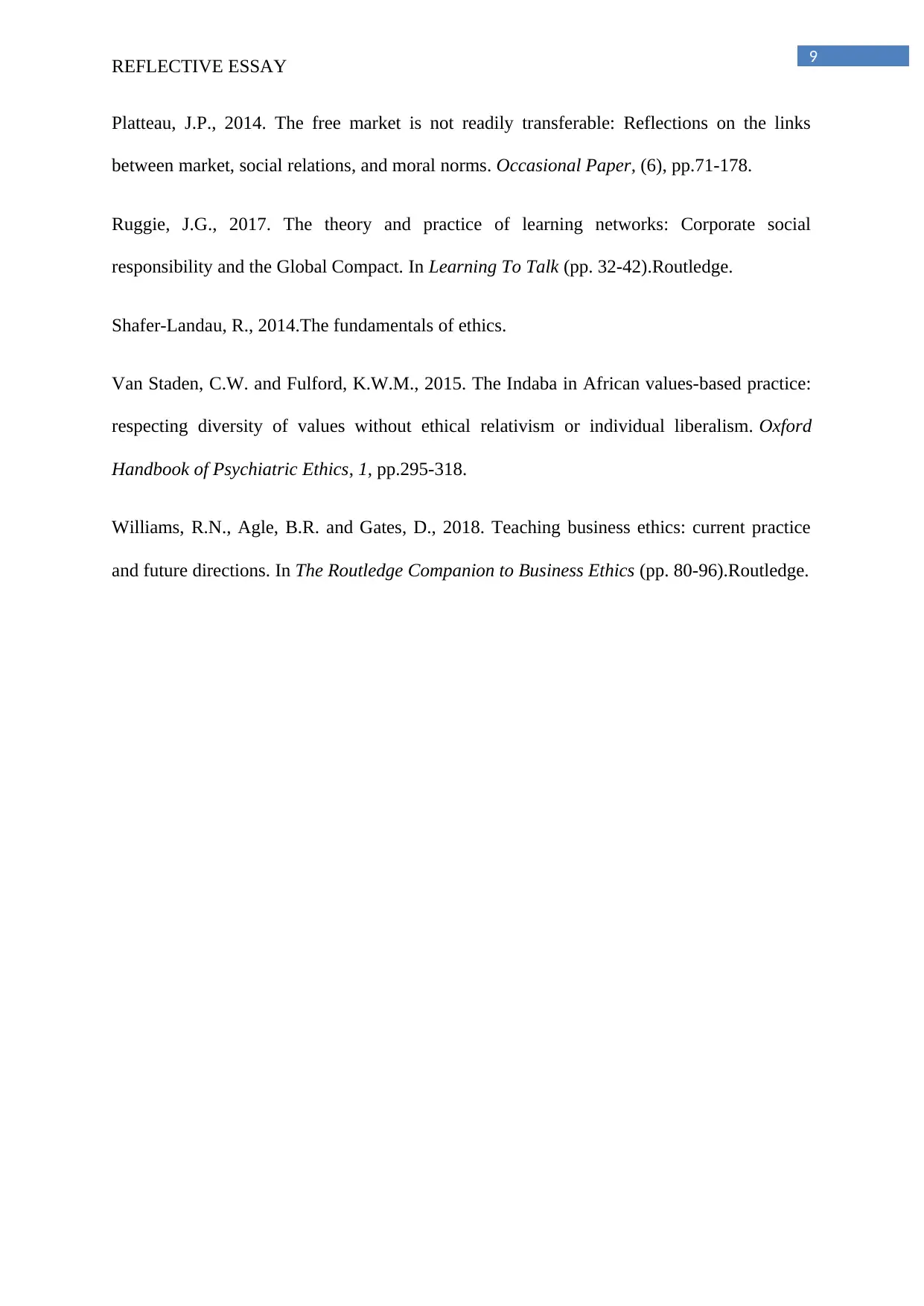
9
REFLECTIVE ESSAY
Platteau, J.P., 2014. The free market is not readily transferable: Reflections on the links
between market, social relations, and moral norms. Occasional Paper, (6), pp.71-178.
Ruggie, J.G., 2017. The theory and practice of learning networks: Corporate social
responsibility and the Global Compact. In Learning To Talk (pp. 32-42).Routledge.
Shafer-Landau, R., 2014.The fundamentals of ethics.
Van Staden, C.W. and Fulford, K.W.M., 2015. The Indaba in African values-based practice:
respecting diversity of values without ethical relativism or individual liberalism. Oxford
Handbook of Psychiatric Ethics, 1, pp.295-318.
Williams, R.N., Agle, B.R. and Gates, D., 2018. Teaching business ethics: current practice
and future directions. In The Routledge Companion to Business Ethics (pp. 80-96).Routledge.
REFLECTIVE ESSAY
Platteau, J.P., 2014. The free market is not readily transferable: Reflections on the links
between market, social relations, and moral norms. Occasional Paper, (6), pp.71-178.
Ruggie, J.G., 2017. The theory and practice of learning networks: Corporate social
responsibility and the Global Compact. In Learning To Talk (pp. 32-42).Routledge.
Shafer-Landau, R., 2014.The fundamentals of ethics.
Van Staden, C.W. and Fulford, K.W.M., 2015. The Indaba in African values-based practice:
respecting diversity of values without ethical relativism or individual liberalism. Oxford
Handbook of Psychiatric Ethics, 1, pp.295-318.
Williams, R.N., Agle, B.R. and Gates, D., 2018. Teaching business ethics: current practice
and future directions. In The Routledge Companion to Business Ethics (pp. 80-96).Routledge.
1 out of 10
Related Documents
Your All-in-One AI-Powered Toolkit for Academic Success.
+13062052269
info@desklib.com
Available 24*7 on WhatsApp / Email
![[object Object]](/_next/static/media/star-bottom.7253800d.svg)
Unlock your academic potential
Copyright © 2020–2026 A2Z Services. All Rights Reserved. Developed and managed by ZUCOL.



